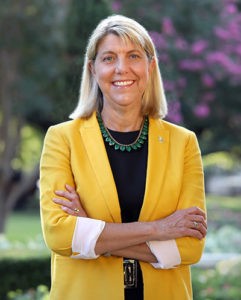A $1.5 million gift will place a Baptist university among a select set of U.S. schools conducting scholarly research and engaging students on the topic of food security.
Baylor University in Waco, Texas, announced the gift from Jim and Tammy Snee of Austin, Minn., which will establish an endowed faculty chair to lead research efforts addressing food security through the Baylor Collaborative on Hunger and Poverty. That major gift will be matched by funds available through the Baylor Academic Challenge, creating a total initial endowment of $3 million.
This is the 14th new academic chair established through the Baylor Academic Challenge, and it is likely the most unique. While other academics study quantum physics and ancient languages, this position will work toward an extremely practical goal: Ending hunger.

Linda Livingstone (Photo/Baylor)
“We are truly grateful for Jim and Tammy Snee and for their family’s commitment to ending hunger in the world,” said Baylor President Linda A. Livingstone. “We are grateful that they are entrusting Baylor and the Baylor Collaborative on Hunger and Poverty to lead this incredibly important and urgent effort to find solutions and best practices to address hunger at home and abroad.”
Most other U.S. universities with academic programs related to food security are public schools, often schools with historic ties to agriculture. Baylor approaches the subject not from an agriculture background — it was founded as a liberal arts school — but as a matter of social and economic justice.
Jim Snee serves as chairman of the board, president and chief executive officer of Hormel Foods, a global food company. Tammy Snee is a public health advocate and has been a nurse for more than 20 years, including at Mayo Clinic.
Their gift will allow Baylor to recruit a faculty scholar who will lead research on food security, create collaborations with others interested in the topic and foster academic programs that involve food companies, food justice advocates and nonprofit leaders.
Having an endowed chair in this specialized area will create “a significant recruiting tool” to bring other scholars to collaborate, explained Jeremy Everett, executive director of the hunger collaborative, previously known as the Texas Hunger Initiative.
“Food security is critical to building a more equitable and inclusive world where all children and their families have access to the food they need to flourish.”
“Food security is critical to building a more equitable and inclusive world where all children and their families have access to the food they need to flourish,” Everett added.
The hunger and poverty collaborative already works in the areas of research, policy and practice, focusing on hunger, economic justice, immigration and criminal justice. It has provided technical assistance to each state in the U.S., plays a central role in consulting with policymakers in Washington, D.C., and has field organizers across Texas coordinating Hunger Free Community Coalitions.
Baylor’s current strategic plan prioritizes this work, which the university says integrates social science with social responsibility.
Related articles:
Want to help slow immigration to the U.S.? Address global hunger
Baylor initiative feeds 270,483 children in 43 states amid a global pandemic


